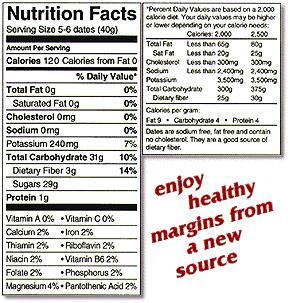|
Basic
Rules
The
most important aspect of bodybuilding is what you eat.
You
can spend hours per day in the gym but how you spend
your time at the plate is the determining factor for
success or failure.
Answer
these three questions.
1.) How
many calories are in one gram of carbohydrate?
(4)
2.) How
many calories are in one gram of
protein?
(4)
3.) how
many calories are in one gram of fat?
(9)
If you
were correct on all three of the questions than congrats
to you. If any answer was incorrect than you must know
all you can about these three little building blocks.
All three are necessary to build a better body only if
taken in the proper ammounts. Before making any dietary
decisions please talk to your health care professional.
This section will break down these three components of
food and discuss how a bodybuilder should eat, drink and
be healthy.
First
lets look at whats on the back of almost every packaged
food item in the United States. Here is an example of
the nutritional facts of foods.

Look at
the three items that we have discussed. Total Fats,
Total Carbohydrate and Protein. Next to each one is a
number with the letter "g" following the
number. That letter means GRAMS. Do you remember how to
convert grams to calories? Lets try on this one.
0 is the
number of grams of fat in this food., how many fat
calories are in this serving of food?
0x9=0............zero
calories of fat.
31 is the
number of grams of carbohydrate in this food., how many
carbohydrate calories are in this serving of food?
31x4=124....124
calories of carbohydrate
1 is the
number of grams of protein in this food., how many
protein calories are in this serving of food?
1x4=4...........four
calories of protein.
You must
know this to enable yourself to manage your meals.
Remember the most important part of bodybuilding is what
and when you eat.
Here
are some basic rules to a healthy diet.
- Find
out how many calories your body needs just to
maintain your weight. There are many different
- formulas
and software programs that will help you find your
number, but as a general rule of thumb
try
to take in 12-15 calories per pound of body weight
per day. In other words, simply multiply your weight
in pounds by 12-15.
Example:
I weigh 180 pounds 180x15=2700 calories.
Now
you may want to increase or decrease those numbers
depending on your body fat and activity level. My
caloric intake is closer to 3500-4000 calories
because my body fat is low and activity level is
high. And my goal is to gain more weight.
- Eat
five or six times each day. They must be small meals
with high nutritional value. (no fast food)
- Reduce
your fat intake. I would never exceed 20 percent of
calories from fat. I stay at 15 percent. If you do
not know how to do the math, learn it. Take a
2000-calorie diet and figure what 20 percent of that
is…Yes 400 calories. For a 2000 calorie per day
diet you should get no more than 400 of those
calories from fat. How many grams of fat are in 400
calories? Take the time to figure that one out on
your own. I am using 20 percent to make the math
easy. You should be around 15 percent even if you
have a low percentage of body fat.
- Keep
your carbohydrate intake to 40-45 percent and do not
eat a lot of carbohydrates in the evening
- Keep
your protein intake to no more than 40 percent. And
see your doctor about the so-called risks associated
with a high protein diet.(I drink a lot of water to
counter any risk of kidney dysfunction associated
with high protein diets)
- Eat
all good foods, fresh vegetables, Whole grains, lean
meats, fish, and fruits. Stay away from processed
foods, as they tend to have a lot of nasty stuff in
them.
- Keep
your carbohydrate intake high during the first part
of the day and lower in the evening hours.
- Consume
a large amount of protein and carbohydrate within 1
hour of a workout. Try to drink a protein shake with
juice soon after you finish training. My drink
consists of about 1000 calories.
- Know
the nutritional value of what you are eating. If you
have any questions as to how many calories or how
much fat is in your food you can purchase training
software or search the USDA
nutritional database and get it for free..I
would also suggest keeping a diary of foods eaten on
a daily basis untill you have a diet that you are
comfortable with.
- Stop
eating crap. If you are going to train than train at
100 percent. Lifting weights is an easy task,
changing your lifestyle is where the work is.
Remember
these ratios
15%
FAT
45%
CARBOHYDRATE
40%
PROTEIN
&
Drink
lots of water
|